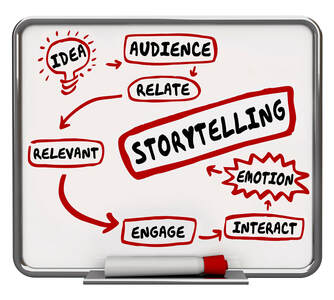 The way we view and process entertainment, advertising, and general information has changed so much over just the last 10-15 years. With the rise of the internet, our short attention spans have never been shorter. One thing that hasn't changed over thousands of years of written human history? The appeal of a good story. Whether we're listening to a podcast via our smartphone, watching television, or seeing a play in the theater, the desire to hear good storytelling is woven into our DNA. No matter what type of media through which we consume them, people will always love to see, hear, and feel stories. This is also true when it comes to advertising. Scratch that - it's especially true when it comes to advertising. Let's look at three reasons why storytelling is such a powerful tool in building your brand. Allows You To "Show, Don't Tell" There's an old saying in the worlds of writing and entertainment. It applies to TV, film, novels, and pretty much any other form of communication you can think of. "Show. Don't tell." You can tell your customer exactly what to think or feel. You can coldly state facts in a rote manner. It may or may not work. Showing them the power of your product through a well-told story? That goes a lot farther. When it comes to persuasiveness, anecdotes trump cold, hard facts every time. There is scientific evidence that stories help messages resonate. These stories can be true, dramatized, or apocryphal. The specific facts don't matter as much as the feeling of authenticity the story brings to mind. Demonstrate your brand's message and value proposition through a well-crafted narrative as opposed to droning on about all the reasons you're so great. Think of it like this: how would you rather get your information: from a gripping novel or a book report? Relatability Another strength of storytelling is the ability to relate to the consumer. Recreating a story your customers may have personally experienced themselves is a great way to create a connection between you and the viewer. The story becomes personalized. It lets the viewer know that your brand understands at least one specific issue, concern, or problem they may have experienced and may have something that can help with it. Or maybe your brand isn't about solving problems, but about cultivating a lifestyle. Maybe you're a luxury brand that leaves your customers feeling like a million bucks. Telling that story is also effective. You can put the viewer into the shoes of someone whose lifestyle has markedly improved due to a brush with your brand. Emotional Reaction Whether it makes us hold our sides from laughing or stings our eyes with tears, a great story also has the ability to stir strong emotions. Tapping into these emotions - whether happy or sad - tends to lead to a strong connection. Watch this Super Bowl ad from 84 Lumber. In only a few minutes, it tells a story more compelling than many of the movies in theaters this weekend! It taps into some primal emotions - fear, uncertainty, patriotism, pride, elation, and relief - and ties them to a brand's message. They anchor these strong emotions to their brand, making sure viewers will associate this uplifting story with their product. It highlights what the company values, which are values most reasonable people would like to share. Telling a story - with your brand as the narrative centerpiece - is an incredibly effective way to showcase what you do best. It lets you demonstrate how and why your product works. It relates to the viewer, showing them an experience they themselves may have lived through or want to emulate. And it can draw on powerful emotional reactions to strengthen the connection between the subject of your ad and the consumer. At Orbital Socket, we consider ourselves storytellers. We want to help you tell your story in the most imaginative, striking way possible. For more on how we can do that, contact us today!
0 Comments
Leave a Reply. |
AuthorGreg Johnson, Managing Director-Orbital Socket Archives
May 2021
Categories |
Hours9 - 5 Weekdays Closed Weekends
|
Telephone |
|
|

 RSS Feed
RSS Feed

